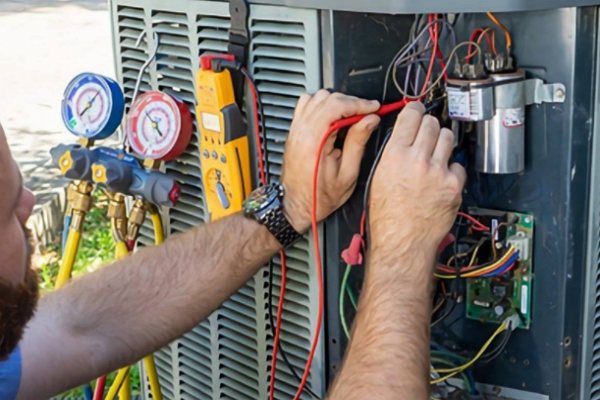
It is important to be familiar with the different types of work electricians do when considering a career in the field. There are many types to choose from, such as residential electricians or power grid engineers. Listed below are some examples of the different types of electrician jobs. If you're curious about the job description of a specific type, read on to learn more about each of these professions. You might even consider becoming an electrician!
Electrical engineers
Electrical engineers are electrical workers, as the name implies. It is very demanding because they often have to take on large projects and invest significant amounts of money. Because of this, there is high competition for jobs, and the work-life balance can be difficult. Here are some suggestions for choosing an electrical engineering career. You might consider an apprenticeship if this is something you are interested. It can lead you to a rewarding and lucrative career.
Electrical engineers are specialists in electrical system design. They design and supervise the manufacture of electrical equipment. An array of projects are undertaken by electrical engineers, ranging from small-scale energy transmission to large-scale. They also help to improve and design existing electric systems. Electrical engineers use a variety of skills to create products that help improve the quality of life and make the world a better place to live. The job is varied and interesting because of the vast nature of their work.

Telecommunications electricians
Telecommunications engineers do all types of work, from setting up the equipment for users to training them in connections. While some individuals work independently, others must be available for overtime or weekends. You must protect your cables from lightning and mice. But even the best workers can make mistakes and spill coffee on important outlets. You have many options for getting your education and training to be a telecommunications technician.
Telecommunications technicians can work anywhere, urban or rural. Some of the cables are strung directly overhead on telephone poles while others run across branch lines. This job requires hands-on experience as well as classroom learning. Apprenticeships can take up to three to five year to complete. Many telecom electricians receive the same training and experience as electrical linemen. However, a bachelor's degree will help you get started as a telecom installation specialist.
Industrial electricians
Industrial electricians work in electrical installations and control. Although they are most often responsible for installing new equipment and maintaining existing ones, industrial electricians can also fix and maintain machinery and perform preventive maintenance. They are responsible for understanding the underlying issues behind electrical system problems and communicating them with their clients. They might be required to replace critical electrical equipment or to prepare maintenance reports for industrial facilities. These reports can be used to verify compliance and ensure proper maintenance of electrical systems.
Most electricians work 40 hours a week, but industrial electricians are often on-call for extra hours, such as holidays or inclement weather. These electricians often work long hours and sometimes have to sacrifice their family time. Industrial electricians often work overtime, which can include working weekends, holidays, and even during system outages. As you gain experience, the initial salary for this job will rise. It is possible to expect to work at minimum 40 hours per semaine and earn a decent living by combining education and training.

Residential electricians
If you have ever wondered what residential electricians do, read on. Residential electricians usually work in larger commercial buildings. However, commercial electricians tend to work with higher voltage systems like 120V or240V. Residential electricians may use thinner gauge cables and have less insulation than commercial ones. They also need more insulation, such as sheathing, for the wiring that runs throughout a house. A combination of plastic conduits and sheathing is used by residential electricians. Commercial electricians may use larger wires.
Residential electricians do many other tasks as well. They can, for example, install an electrical service, run conduit, or employ wiring protection measures. They can also install circuit-breaker boxes and other residential electricity systems. They may also be involved in electrical design, including the placement of lighting fixtures and heating and air conditioning systems. They could also participate in new construction projects. They might also be able to advise on the installation and maintenance of circuit breakers boxes or other electrical systems.
FAQ
What is a Service Agreement Template?
A service contract template is a document that includes all details regarding a service agreement. A service agreement template is used to create a standard form of agreement.
Service agreements are important as they establish the relationship between two people.
They assist both parties in understanding each other's needs, and their expectations. They also ensure that both parties know exactly what they are getting into before signing off on the deal.
When do I have the obligation to pay for the service/contractor
The service you are receiving will dictate the payment schedule. A contractor might hire to install a roof. You would usually pay when the work is complete. If you purchase a product, such a cooker for your kitchen, from a supplier you might only make payments after it has been tested and received.
Is there a limit on the amount I can spend on this project?
No. No. The contractor may be willing to negotiate a lower price.
What happens to one party if they don't want the other side?
The law allows you to sue the other party for damages if you don't fulfill your agreement. Damages are the amount owed, plus interest, court costs, legal fees.
Statistics
- Depending on the client's trustworthiness and financial stability, a deposit is usually 10 to 50% of the total contract amount. (lawdepot.com)
- While we offer all our high-quality services at competitive prices, we know that many who need our services are on fixed incomes, so we offer a 10 percent discount for seniors and military members. (homeservicecontractorsinc.com)
- (v) Place or places of performance of the prime contract and first-tier subcontracts estimated at $10 million or more, if known. (acquisition.gov)
- (1) Ascertain the extent to that offers are based on the payment of overtime and shift premiums; and (2) Negotiate contract prices or estimated costs without these premiums or obtain the requirement from other sources. (acquisition.gov)
- Reasonable late fees go up to 25% per year on unpaid sums. (lawdepot.com)
External Links
How To
How do you write a good service agreement?
You must remember two things when writing a service agreement.
First, you have to meet the needs of the customer.
You must secondly comply with legal requirements.
You need to make sure that these things are included in your service agreement.
-
Identify the parties.
-
Define the subject matter.
-
Indicate the length of the agreement.
-
Determine whether you provide warranties.
-
Describe the obligations and liabilities of both parties.
-
Establish the mode of payment.
-
Make clear how disputes are resolved.
-
Please provide details regarding any restrictions or special instructions.
-
Ensure that both parties sign the contract.
-
Include a clause declaring that the agreement was understood and read before it is signed.
-
Make sure that you have a copy of the agreement with you.
-
Once you have written up your service agreement, make sure that you review it carefully before sending it off to the buyer.
-
If you have any concerns about the agreement, please contact your supplier immediately to fix it.
-
Send off the revised version once everything is corrected.
-
Do not sign the agreement until you have received confirmation from the buyer that they have accepted the changes made.
-
Keep a copy both of the original and finalized agreement.
-
Make sure you are aware that service providers in certain countries have legal responsibility for ensuring their customers receive high quality services.
-
In case of dispute, keep a record of all correspondence between yourselves and the customer.
-
Seek professional guidance on how to best draft a service arrangement.
-
After agreeing to the terms, the buyer can request a modification to the contract terms.
-
Always confirm that you have read and understood the change request before you accept it.
-
Never accept a request for a change without first checking.
-
If you do not want to accept the change, tell the customer why.
-
If they are still not on board, tell them that you do not accept the change.
-
Refuse to sign the contract if the customer refuses to agree to your decision.
-
Once you have accepted the decision of the customer, you can then complete the contract.
-
You must agree to change the terms of your contract if you have already agreed to it.
-
Before you send the contract out, ensure you have thoroughly read it.
-
Also make sure it is in compliance with the law.
-
Send the contract to the buyer after you have completed it.
-
Final note: Keep a copy the contract completed for future reference.
-
Failure to follow these simple rules could result in you losing money.
-
A good service agreement can be written quickly.
-
The better the detail,